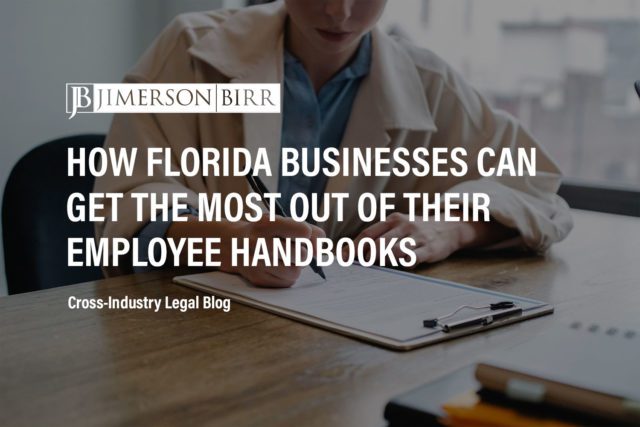What do collective bargaining agreements encompass?
Collective bargaining agreements (CBAs) are contractual agreements negotiated between employers and labor unions, outlining the terms and conditions of employment specifically for union members. CBAs comprehensively address various aspects of the employment relationship, encompassing elements such as wages, working hours, conditions, and procedures for handling grievances.
In Florida, as in any other state, CBAs are governed by the National Labor Relations Act (NLRA) for private-sector employees. Florida’s public-sector employees, though, are subject to the Florida Public Employees Relations Act (PERA).
Need help with training, compliance, or litigation to protect your workplace? Schedule your consultation today with a top employment law attorney.
Which laws, rules, and regulations apply to collective bargaining agreements?
In Florida, the purview of collective bargaining agreements extends across both federal and state regulations. The primary federal law is the National Labor Relations Act (NLRA), applicable to the majority of private-sector employers and their employees. The NLRA safeguards employees’ rights to form, join, or assist labor organizations, engage in collective bargaining, and participate in concerted activities for mutual aid and protection.
Additionally, the Fair Labor Standards Act (FLSA) sets minimum wage, overtime pay, and child labor standards, which may be incorporated into CBAs. While CBAs can offer more generous benefits, they cannot diminish the protections guaranteed by the FLSA.
As previously mentioned, public-sector employees in Florida are governed by the Florida Public Employees Relations Act (PERA), which delineates labor relations between public employers and their employees. PERA outlines the rights and responsibilities of both parties, including the right to engage in collective bargaining.
What are common issues associated with collective bargaining agreements that lead to litigation against employers?
Various legal challenges tied to collective bargaining agreements often result in litigation between employees and employers. These include:
- Breach of contract claims: Lawsuits may be filed when either the employer or union deviates from the agreed-upon terms of a CBA.
- Unfair labor practices: Allegations of unfair labor practices may arise if there are violations of the NLRA or Florida’s PERA by the employer or union.
- Wage and hour disputes: Employees may initiate legal action over unpaid wages, overtime pay, or other compensation-related matters when CBAs do not align with FLSA requirements.
- Discrimination or harassment claims: Lawsuits may be brought forth by employees under federal and state anti-discrimination laws, such as Title VII, the ADA, or the Florida Civil Rights Act.
What are the perquisites to file a lawsuit regarding collective bargaining agreements, and what legal defenses may employers assert?
To initiate a lawsuit concerning collective bargaining agreements, employees must meet specific legal prerequisites:
- Exhaustion of administrative remedies: Prior to court action and depending on their type of employer (private versus public), employees must file a charge with either the National Labor Relations Board (NLRB) or the Florida Public Employees Relations Commission (PERC).
- Timeliness: Charges must be filed within stipulated time limits.
- Standing: Lawsuits can only be filed by employees, unions, or employers with a legal interest in the CBA.
- Grievance and arbitration procedures: Employees must adhere to any outlined grievance or arbitration procedures in the CBA before pursuing legal action.
Employers can assert various legal defenses against claims arising from collective bargaining agreements:
- Compliance with the CBA: Employers may argue that their actions align with the CBA’s terms.
- Statute of limitations: Employers may claim the employee’s lawsuit is time-barred if not filed within the applicable limitations period.
- Failure to exhaust administrative remedies: Employers may contend that the employee did not complete required administrative remedies before filing a lawsuit.
- Failure to follow grievance procedures: If the employee did not adhere to the CBA’s grievance or arbitration procedures, employers may use this as a defense.
To determine whether your unique situation may necessitate litigation or another form of specialized advocacy, please contact our office to set up your initial consultation.
What measures must employers take to legally comply with collective bargaining agreements?
Ensuring compliance with the legal requirements of collective bargaining agreements demands that employers undertake several essential measures:
- Negotiating in good faith: Employers must engage in honest, sincere, and genuine negotiations with the union representing employees.
- Implementing agreed-upon terms: Employers must adhere to and enforce the terms of the CBA, covering aspects such as wages, working hours, and conditions.
- Resolving disputes through grievance and arbitration procedures: Employers must diligently follow the outlined grievance and arbitration procedures in the CBA to address disputes.
- Complying with federal and state labor laws: Employers must diligently ensure compliance with applicable labor laws, encompassing the NLRA, FLSA, and Florida’s PERA.
Please contact our office to set up your initial consultation to see what forms of legal advocacy or intervention may be available for your unique situation.
Frequently Asked Questions
Can employees negotiate a CBA without a union?
No, employees must be represented by a union to negotiate a CBA with their employer.
Can an employer change the terms of a CBA unilaterally?
No, an employer cannot unilaterally change the terms of a CBA without engaging in collective bargaining with the union.
What happens if a CBA expires before a new agreement is reached?
If a CBA expires before a new agreement is reached, the employer must maintain the status quo, meaning they cannot change terms and conditions of employment without bargaining with the union.
Have more questions about employment law training, compliance, or litigation?
Crucially, this overview of collective bargaining agreements does not begin to cover all the laws implicated by this issue or the factors that may compel the application of such laws. Every case is unique, and the laws can produce different outcomes depending on the individual circumstances.
Jimerson Birr attorneys guide our clients to help make informed decisions while ensuring their rights are respected and protected. Our lawyers are highly trained and experienced in the nuances of the law, so they can accurately interpret statutes and case law and holistically prepare individuals or companies for their legal endeavors. Through this intense personal investment and advocacy, our lawyers will help resolve the issue’s complicated legal problems efficiently and effectively.
Having a Jimerson Birr attorney on your side means securing a team of seasoned, multi-dimensional, cross-functional legal professionals. Whether it is a transaction, an operational issue, a regulatory challenge, or a contested legal predicament that may require court intervention, we remain tireless advocates at every step. Being a value-added law firm means putting the client at the forefront of everything we do. We use our experience to help our clients navigate even the most complex problems and come out the other side triumphant.
If you want to understand your case, the merits of your claim or defense, potential monetary awards, or the amount of exposure you face, you should speak with a qualified Jimerson Birr lawyer. Our experienced team of attorneys is here to help. Call Jimerson Birr at (904) 389-0050 or use the contact form to schedule a consultation.
Here are some blogs written by JB attorneys that provide more information about employment law:
- Independent Contractor or Employee: Know the Difference (jimersonfirm.com)
- Rescinding Job Offers in At-Will Employments in Florida | Jimerson Birr (jimersonfirm.com)
- Tips for Drafting Employee Handbooks in Florida | Jimerson Birr (jimersonfirm.com)
- Understanding The EEOC Process: Employee Sexual Harassment And Sexual Discrimination Claims In The Era Of #MeToo (jimersonfirm.com)
- Contesting OSHA Violations and OSHA Citations: A Guide To OSHA Employer Rights (jimersonfirm.com)
- What Do Contractors Need to Know About Employee Duty of Loyalty and Ability to Compete | Jimerson Birr (jimersonfirm.com)

We live by our 7 Superior Service Commitments
- Conferring Client-Defined Value
- Efficient and Cost-Effective
- Accessibility
- Delivering an Experience While Delivering Results
- Meaningful and Enduring Partnership
- Exceptional Communication Based Upon Listening
- Accountability to Goals











